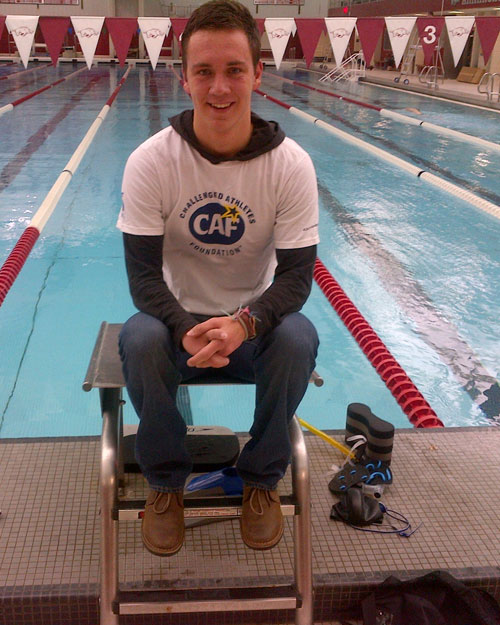
Nathan Whitten is a full-time college student and athlete – not an unusual feat for a 21-year-old attending a state university. However, his athletic endeavors stemmed recently from a personal quest to learn about new aspects of competition. He trains with the University of Arkansas swim team, attends training meets six days a week, and travels nationwide to compete, and he does it all with only five fingers. He lives with a physical disability, yet lets nothing get in his way.
Whitten, who was adopted from Russia as a child, was born with deformities of both of his hands, giving him use of five fingers. Moving from a childhood in an orphanage in Moscow to a home and family in the United States, he was quickly taught that his disability would not be considered a negative factor in his daily life. Throughout middle school and high school, he competed on the junior high football and basketball teams, cross country and various other hobbies. Whitten grew up in Houston.
After enrolling at the University of Arkansas, he joined the Boys and Girls Club of Fayetteville as an after-school-program teacher, worked as a leader at summer camp, and recently began training for a spot in the 2016 Paralympic events in Rio de Janeiro. Now, his six day-a-week training is only one aspect of his journey from regular student to nationally competitive athlete.
It wasn’t until Whitten’s spring semester in 2012 that he was introduced to the idea of getting involved in the Paralympic games. He was taking the sport sociology course in the College of Education and Health Professions taught by Amanda Sullivan, clinical assistant professor of kinesiology. Other students noticed that Whitten’s disability wasn’t an issue when it came to sports, in addition to his competitive nature and athletic skills. They asked him why he wasn’t competing.
“I took that question and did some research into what sports the Paralympics offer in winter and summer and what sports I could do,” said Whitten, a kinesiology major.
That was in March 2012; just a year-and-a-half later, he’s traveled from Oklahoma to California, getting classified to compete and training at competitive meets, his record now only 4 seconds away from being considered a nationally competitive athlete.
Swimming was the obvious choice because it was inexpensive, required little prior knowledge and Whitten had what equipment he needed right on campus in the Health, Physical Education and Recreation Building.
“Swimming was the most suitable because of the HPER being here,” Whitten said. “In April, I started training because there was a meet in Oklahoma in June, which was where I got classified, at the University of Central Oklahoma in Edmond. I needed help so I approached Dr. Sullivan. She let me know that she had swimmers in her classes, and ended up emailing them and asking if any would reach out and help with preparing me for Oklahoma.”
Whitten was partnered with swim-team athletes Susanna White, Rebekah Harvey, Sevannah Vekas, Lauren Jordan and Tera Bradham. They worked individually with Whitten to train with him for the upcoming year.
For Whitten, it was the opportunity of a lifetime.
“I came with no prior knowledge of swimming, apart from things like summer camp, so it was great because it gave me a better look at my swimming ability,” he said. “Working with someone of the same age, but with people who are competing at the Division I level, is good because it’s kind of like we’re all the same.”
In June 2012, Whitten traveled to Edmond, Okla., to classify for the Paralympics. In swimming, 14 classifications are divided into 10 for physical disability, three for vision impaired, and one for cognitive delay. Whitten was working at a summer camp in Texas, and, although having little time to train, he used nights off and breaks to train doing dry-land workouts in preparation for his weekend away at the classification meet.
He received a grant from the Challenged Athletes Foundation in San Diego to help pay for equipment and costs of training.
Now, he’s traveling across the nation at any chance he gets to compete in meets both for people with disabilities and people without, all in preparation for the Rio Paralympics. Whitten doesn’t see Rio as an ending point but rather a moment in his journey as an athlete. In December, he competed in Springdale, and he’s looking forward to the chance to attend the CanAm competitive events in Miami in March. Through competing and placing at events such as these, Whitten will continue to fight for a spot for his dream of the Paralympic events in the upcoming years.
For now, the road continues toward the next meet, faster swim time and intensive training schedule. Pushing forward without ever letting his physical differences hold him back, Whitten keeps his eye on Rio 2016 while living in the moment as a locally and nationally recognized special-needs athlete.
By Emily Rhodes
Contacts
Heidi Wells, director of communications
College of Education and Health Professions
479-575-3138,